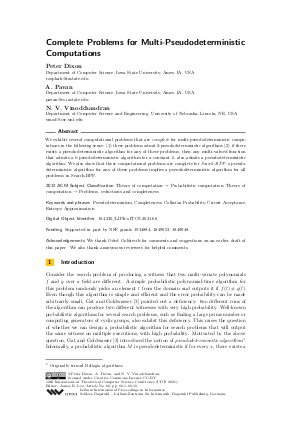Complete Problems for Multi-Pseudodeterministic Computations
Authors Peter Dixon, A. Pavan, N. V. Vinodchandran
-
Part of:
Volume:
12th Innovations in Theoretical Computer Science Conference (ITCS 2021)
Part of: Series: Leibniz International Proceedings in Informatics (LIPIcs)
Part of: Conference: Innovations in Theoretical Computer Science Conference (ITCS) - License:
 Creative Commons Attribution 3.0 Unported license
Creative Commons Attribution 3.0 Unported license
- Publication Date: 2021-02-04
File

PDF
LIPIcs.ITCS.2021.66.pdf
- Filesize: 0.5 MB
- 16 pages
Document Identifiers
Subject Classification
ACM Subject Classification
- Theory of computation → Probabilistic computation
- Theory of computation → Problems, reductions and completeness
Keywords
- Pseudodeterminism
- Completeness
- Collision Probability
- Circuit Acceptance
- Entropy Approximation
Metrics
- Access Statistics
-
Total Accesses (updated on a weekly basis)
0Document
0Metadata
Abstract
We exhibit several computational problems that are complete for multi-pseudodeterministic computations in the following sense: (1) these problems admit 2-pseudodeterministic algorithms (2) if there exists a pseudodeterministic algorithm for any of these problems, then any multi-valued function that admits a k-pseudodeterministic algorithm for a constant k, also admits a pseudodeterministic algorithm. We also show that these computational problems are complete for Search-BPP: a pseudodeterministic algorithm for any of these problems implies a pseudodeterministic algorithm for all problems in Search-BPP.
Cite As Get BibTex
Peter Dixon, A. Pavan, and N. V. Vinodchandran. Complete Problems for Multi-Pseudodeterministic Computations. In 12th Innovations in Theoretical Computer Science Conference (ITCS 2021). Leibniz International Proceedings in Informatics (LIPIcs), Volume 185, pp. 66:1-66:16, Schloss Dagstuhl – Leibniz-Zentrum für Informatik (2021)
https://doi.org/10.4230/LIPIcs.ITCS.2021.66
BibTex
@InProceedings{dixon_et_al:LIPIcs.ITCS.2021.66,
author = {Dixon, Peter and Pavan, A. and Vinodchandran, N. V.},
title = {{Complete Problems for Multi-Pseudodeterministic Computations}},
booktitle = {12th Innovations in Theoretical Computer Science Conference (ITCS 2021)},
pages = {66:1--66:16},
series = {Leibniz International Proceedings in Informatics (LIPIcs)},
ISBN = {978-3-95977-177-1},
ISSN = {1868-8969},
year = {2021},
volume = {185},
editor = {Lee, James R.},
publisher = {Schloss Dagstuhl -- Leibniz-Zentrum f{\"u}r Informatik},
address = {Dagstuhl, Germany},
URL = {https://drops.dagstuhl.de/entities/document/10.4230/LIPIcs.ITCS.2021.66},
URN = {urn:nbn:de:0030-drops-136050},
doi = {10.4230/LIPIcs.ITCS.2021.66},
annote = {Keywords: Pseudodeterminism, Completeness, Collision Probability, Circuit Acceptance, Entropy Approximation}
}
Author Details
Funding
Supported in part by NSF grants 1934884, 1849053, 1849048.
Acknowledgements
We thank Oded Goldrecih for comments and suggestions on an earlier draft of this paper. We also thank anonymous reviewers for helpful comments.
References
-
Jayadev Acharya, Sourbh Bhadane, Piotr Indyk, and Ziteng Sun. Estimating entropy of distributions in constant space. In Advances in Neural Information Processing Systems 32: Annual Conference on Neural Information Processing Systems 2019, NeurIPS 2019, 8-14 December 2019, Vancouver, BC, Canada, pages 5163-5174, 2019.

-
Peter Dixon, A. Pavan, and N. V. Vinodchandran. On pseudodeterministic approximation algorithms. In 43rd International Symposium on Mathematical Foundations of Computer Science, MFCS 2018, August 27-31, 2018, Liverpool, UK, volume 117 of LIPIcs, pages 61:1-61:11, 2018.

-
E. Gat and S. Goldwasser. Probabilistic search algorithms with unique answers and their cryptographic applications. Electronic Colloquium on Computational Complexity (ECCC), 18:136, 2011.

- Michel Goemans, Shafi Goldwasser, and Dhiraj Holden. Doubly-efficient pseudo-deterministic proofs. arXiv, 2019. URL: http://arxiv.org/abs/1910.00994.
-
O. Goldreich, S. Goldwasser, and D. Ron. On the possibilities and limitations of pseudodeterministic algorithms. In Innovations in Theoretical Computer Science, ITCS '13, Berkeley, CA, USA, January 9-12, 2013, pages 127-138, 2013.

-
Oded Goldreich. In a world of P=BPP. In Oded Goldreich, editor, Studies in Complexity and Cryptography. Miscellanea on the Interplay between Randomness and Computation, volume 6650 of Lecture Notes in Computer Science, pages 191-232. Springer, 2011.

-
Oded Goldreich. Multi-pseudodeterministic algorithms. Electronic Colloquium on Computational Complexity (ECCC), 26:12, 2019.

-
S. Goldwasser and O. Grossman. Bipartite perfect matching in pseudo-deterministic NC. In 44th International Colloquium on Automata, Languages, and Programming, ICALP 2017, July 10-14, 2017, Warsaw, Poland, pages 87:1-87:13, 2017.

-
S. Goldwasser, O. Grossman, and D. Holden. Pseudo-deterministic proofs. CoRR, abs/1706.04641, 2017.

-
Shafi Goldwasser, Ofer Grossman, Sidhanth Mohanty, and David P. Woodruff. Pseudo-deterministic streaming. In Thomas Vidick, editor, 11th Innovations in Theoretical Computer Science Conference, ITCS, volume 151 of LIPIcs, pages 79:1-79:25, 2020.

-
O. Grossman. Finding primitive roots pseudo-deterministically. Electronic Colloquium on Computational Complexity (ECCC), 22:207, 2015.

-
Ofer Grossman and Yang P. Liu. Reproducibility and pseudo-determinism in log-space. In Proceedings of the Thirtieth Annual ACM-SIAM Symposium on Discrete Algorithms, SODA 2019, San Diego, California, USA, January 6-9, 2019, pages 606-620. SIAM, 2019.

-
I. Oliveira and R. Santhanam. Pseudodeterministic constructions in subexponential time. In Proceedings of the 49th Annual ACM SIGACT Symposium on Theory of Computing, STOC 2017, Montreal, QC, Canada, June 19-23, 2017, pages 665-677, 2017.

-
Igor Carboni Oliveira and Rahul Santhanam. Pseudo-derandomizing learning and approximation. In Approximation, Randomization, and Combinatorial Optimization. Algorithms and Techniques, APPROX/RANDOM 2018, volume 116 of LIPIcs, pages 55:1-55:19, 2018.

-
Liam Paninski. Estimating entropy on m bins given fewer than m samples. IEEE Trans. Inf. Theory, 50(9):2200-2203, 2004.

-
L. Stockmeyer. The complexity of approximate counting (preliminary version). In Proceedings of the 15th Annual ACM Symposium on Theory of Computing, 25-27 April, 1983, Boston, Massachusetts, USA, pages 118-126, 1983.

